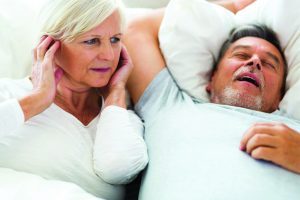By Dr. Gilbert
 We probably all know someone who snores. Who can forget the rumbling, tumbling, and even gasping sounds in the middle of the night? While snoring certainly affects the sleep quality of one’s bed partner, it can also be very problematic for the snorer as well.
We probably all know someone who snores. Who can forget the rumbling, tumbling, and even gasping sounds in the middle of the night? While snoring certainly affects the sleep quality of one’s bed partner, it can also be very problematic for the snorer as well.
Snoring is a sound that originates from vibrations of constricted soft tissues in our throats, or upper airway, during sleep. Sometimes the airway becomes constricted to the extent that no air passes – this is called Obstructive Sleep Apnea (OSA). Many people will vacillate between snoring and Obstructive Sleep Apnea in any given night’s sleep. Typically the apneas, or cessations of breath, will occur when the sufferer reaches the deeper stages of sleep, or REM Sleep. Often the snorer’s bed partner is also sleeping by the time they reach these “deeper” stages of sleep and therefore he or she is sadly unable to physically witness the snorer stop breathing. Thus this alarming and dangerous condition may go unnoticed.
Apneas can result in brief arousals in which the body must momentarily “wake” so the effected individual can take a breath. Thus many OSA sufferers fail to sustain long periods of “deep sleep,” leaving them very poorly rested! Additionally, this lack of prolonged REM sleep can actually trigger the body to produce the stress hormone Cortisol, which can contribute to weight gain. Weight gain in turn can increase the severity of Obstructive Sleep Apnea, creating a compounding cycle of severity. However, the deleterious effects of apnea go far beyond weight gain and poor quality sleep.
Obstructive Sleep Apnea (OSA) is a very serious medical condition because the effected individual may suffer a considerable drop in blood oxygen content. Reduced oxygen in one’s blood stream can lead directly to heart attack and/or stroke. A drop in blood oxygen saturation is particularly problematic for those who concurrently suffer from any other cardiovascular issues due to the tremendously burden reduced oxygen saturations place on one’s heart. Therefore, it is critical we have our snoring loved one’s screened for OSA, particularly those with any concurrent cardiovascular concerns.
A few risk factors commonly seen in Snorers and Apnea Sufferers
. >60 years old
. Overweight
. Recent weight gain >10lbs
. Large neck circumference
. Dental overbite, particularly in individuals with taller, thinner body types
. Irritability
. Day time fatigue
. Falling asleep while reading, watching television and even driving!
. Consuming alcohol prior to bedtime
Treatment Options
The two most widely prescribed, and FDA approved, treatment options for Obstructive Sleep Apnea are CPAP therapy and Dental Appliance therapy. CPAP stands for Continuous Positive Airway Pressure and involves using a positive pressure mask that covers the nose and possibly the mouth. CPAP maintains constant airflow into the nasal passageways, ensuring no disruptions in breathing. When used properly, CPAP therapy is effective; however, for many patients this treatment modality is just too uncomfortable. Therefore they are unfortunately unable to be compliant. Dental Appliance therapy involves custom fabricated “night guards” that fit over ones teeth and serve to hold the bottom jaw up and forward. This protrusion of the lower jaw (false under-bite) relieves the constriction, or blockage of the upper airway. Thus allowing the patient to breathe freely with out aid of positive air pressure. Many sufferers prefer this device because it’s much less invasive than CPAP therapy. Dental Appliance therapy should only be conducted under the guidance of an experienced dentist with training not only in this field, but also in TMJ (jaw joint) management.
If you or a loved one suffers from snoring or sleep apnea, call Pelican Landing Dental at (239) 948-2111. They are located in Bonita Spring on St Rd 41, just south of Coconut Rd and have been helping many patients with these conditions.
Schedule a complimentary consultation with Dr. Rich Gilbert to discuss this important subject so you can return to having a restful night’s sleep. Call 239-948-2111.
Pelican Landing Dental
www.pelicanlandingdental.com










